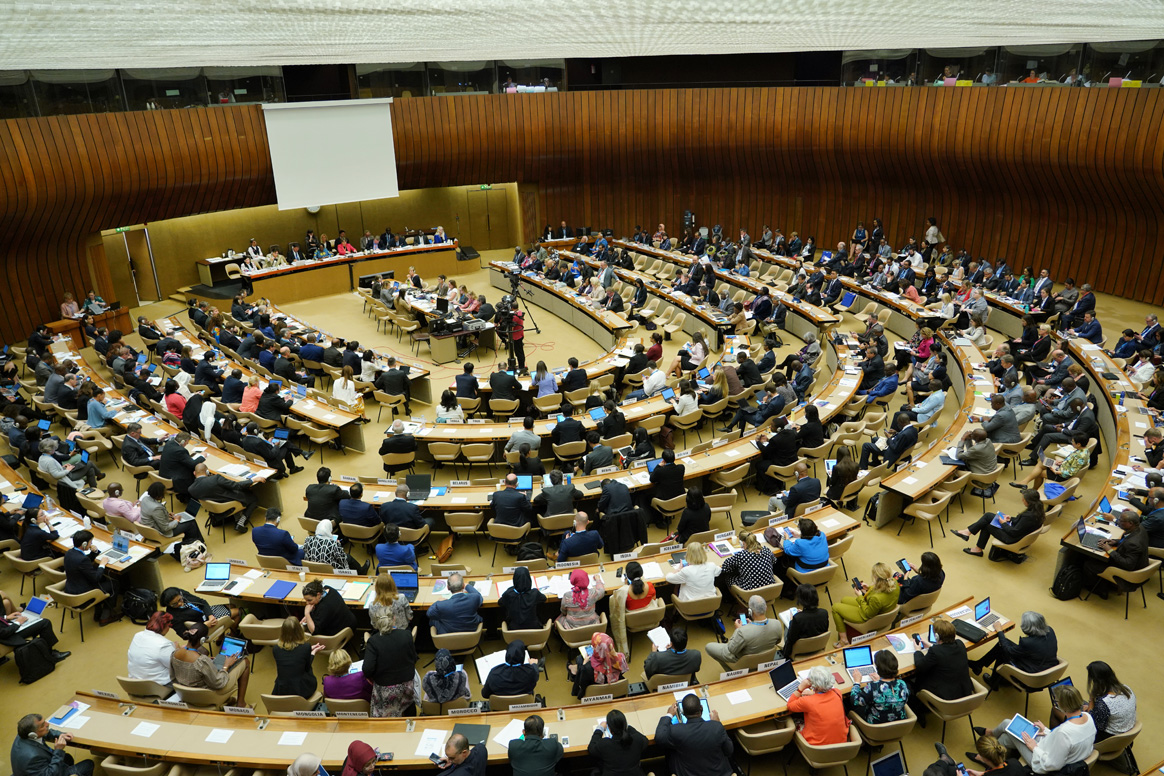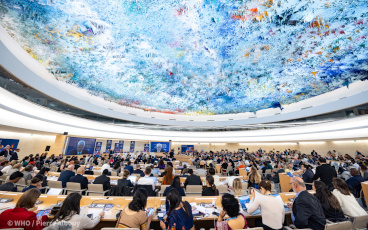“Our challenge is not feasibility, but determination”
Health leaders at 72nd World Health Assembly welcome new Polio Endgame Strategy 2019-23: acknowledge a lot accomplished, a lot more to do to finish global polio eradication

Polio eradication was in high-level spotlight this week in the top echelons of global leadership as World Health Organization (WHO) Member States, donors, partners, civil society organizations, health and development actors gathered this week at the 72nd World Health Assembly (WHA) in Geneva, Switzerland.
In his opening address to delegates, WHO Director-General and Chair of the Polio Oversight Board (POB), Dr Tedros Adhanom Ghebreyesus talked about the long-winding journey of polio eradication since its adoption as a landmark resolution at the WHA in 1988 and the hopes of finishing eradication in the near future: “Together with our partners at Rotary, CDC, UNICEF, the Bill & Melinda Gates Foundation and Gavi, the Vaccine Alliance in the Global Polio Eradication Initiative, we have launched a new strategy to address the most difficult remaining areas in Afghanistan and Pakistan. Earlier this year I came across a video of a man called Irfanullah, wading through snow to deliver polio vaccines in Pakistan. With the dedication and commitment of people like him, I have no doubt we will succeed in making polio history.”
Member States expressed overwhelming support of the Polio Endgame Strategy 2019-2023. The new strategy sets the stage for a decisive win against polio through the parallel pursuit of the wild poliovirus and circulating vaccine-derived poliovirus. The Strategic Plan incorporates collaboration with other health interventions, fostering stronger alliances and managerial innovations by working in close coordination with governments in endemic countries. The Member States welcomed the trifecta of Eradication, Integration, and Containment/Certification, which set the foundations of a sustainable polio-free world by anchoring polio activities within the broader immunization system, ensuring an effective transition of eradication knowledge and assets and ensuring that no poliovirus can paralyze children again.
With an eye towards an inclusive and sustainable polio-free future, there was broad consensus that all stakeholders—governments, GPEI partners, private and public donors, policy makers, health, and non-health actors— are in this together. One of the recurring themes was the need to ensure concerted efforts—financial and programmatic— to get over the hump in this last mile over to the finish line.
The general air was that of cautious optimism, as all Member States acknowledged that the path to finishing polio eradication is well within sight, all thanks to the Endgame Plan 2013-2018 which succeeded in certifying South-East Asia (SEARO) as polio-free, brought the African Region closer than ever to eradication of wild poliovirus, possibly eradicated two out of three wild poliovirus strains, set the world on the path of phased Oral Polio Vaccine (OPV) removal, stopped outbreaks in Syria and Horn of Africa, and cornered wild poliovirus circulation to a joint cross-border reservoir between Afghanistan and Pakistan.
The delegates particularly appreciated the strong commitments espoused by Afghanistan and Pakistan for a more systematic collaboration to jointly target the common wild poliovirus reservoir on all fronts with an approach that combines the scientific with the social and anthropological. Pakistan’s representative said, “We remain resolute with the highest level of political commitment… strengthening routine immunization, addressing prevalent malnutrition, and provision of safe water and sanitation are strategies being implemented in tandem. Communication challenges of low-risk perception and concerns around vaccine safety and efficacy are being addressed through a revised communication strategy. We continue to coordinate with Afghanistan programme to share experience in strategies to manage the common epidemiological block. In light of the recent cases, the Government of Pakistan has decided to carry out a comprehensive programme review on an urgent footing. I would like to sincerely thank our partners and donors who are a part of this initiative and helped us get this far. We pledge our complete commitment to reach every last child, so no future generations have to suffer from a crippling disease like polio.”
Rotary International, one of the pioneering partners of the GPEI, maintained that wild poliovirus eradication remains the overriding priority, and to that end, re-affirmed collective commitment of their 1.2 million members around the world: “It is easy to forget the hurdles we have overcome—such as: addressing outbreaks in more than 20 countries in Africa, or how India had 80% burden of the total polio caseload in the world. Our challenge is not feasibility, but determination…global commitment has brought us to the threshold of a polio-free world. Let us act with urgency to end polio forever.”
In his closing remarks, Dr Tedros thanked the Crown Prince of Abu Dhabi and the United Arab Emirates for hosting a pledging moment for the Global Polio Eradication Initiative, “Global progress to end polio would not be possible without partners like the UAE. I would like to thank His Highness Sheikh Mohamed bin Zayed Al Nahyan, Crown Prince of Abu Dhabi, and the UAE – a long-time supporter of the polio programme – for agreeing to host the GPEI pledging event this November at the Reaching the Last Mile Forum, a gathering of leaders from across the global health space.”













